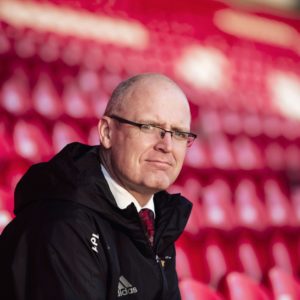 Enda Lynch, Head of Enterprise with Munster Rugby, is a commercial and sponsorship veteran with some of Ireland’s leading brands. Enda’s current role oversees a new business venture for Munster Rugby, the High-Performance Leadership programme, in partnership with University of Limerick.
Enda Lynch, Head of Enterprise with Munster Rugby, is a commercial and sponsorship veteran with some of Ireland’s leading brands. Enda’s current role oversees a new business venture for Munster Rugby, the High-Performance Leadership programme, in partnership with University of Limerick.
Previously Enda was Head of Commercial & Marketing with Munster Rugby overseeing all revenue generation and marketing for the organisation for over five years. Prior to that, he was a sponsorship expert, working across a number of sponsorships such as the Irish Rugby team sponsorship, The O2, GAA All-Stars, Ferrari team sponsorship, Champions League etc. for brands both domestically and internationally for over 12 years including O2, Vodafone and Digicel.
What has sport taught you about leadership?
Leadership is a much-misunderstood word. Where people are managers, they think they are leaders. Being involved around and working directly in sport for the last 19 years, I’ve learned that leadership is about so much more than just managing a group of people and their work output.
Learning to perform at your best physically, emotionally and mentally and understanding what the strengths of your style of leadership are, which allow you to be authentic in your delivery, are things which are crucial in sport. There can be no doubt when you take to the pitch that you need to be at your best in all these areas to perform with and for those around you, or indeed for yourself if in an individual sport. When you are, you have clarity in your thinking, you rebound from mistakes quicker, you sustain your performance for longer and drive those around you on to greater things by your example. The same applies to great leaders on and off the pitch.
What are the essential components to building a winning team?
Understanding that each and every component matters is crucial – a car doesn’t work if one tire is punctured. A team doesn’t work if one part isn’t functioning. Therefore each and every part needs to be working at its best from the backroom staff (medics, strength and conditioning, nutrition, logistics, analysis, coaches etc.) right through to the captain on the field.
Great teams have everybody on the same page. They have practised over and over again what it is they are all doing so that nobody is in doubt during a game what is happening to them and around them. It makes execution of the game plan so much easier. That’s why the greatest teams make it look so easy and effortless – because they individually and collectively own responsibility for every part of the game.
What is one characteristic that you believe every leader should possess?
Authenticity. It’s a characteristic that so few leaders possess because they haven’t taken the time to listen and learn from both themselves and those around them – family, friends, work colleagues and bosses – as to what makes them unique, what people feel works for them and what doesn’t work for them. Only when you are truly self-aware can you nurture the strengths and become authentic in your actions, words and thoughts.
If you could wind back the clock to when you were starting your sporting career what advice would you give yourself?
Listen and learn – be self-aware. Young workers entering the marketplace are so keen to prove their worth that they often don’t stop to listen to what is being said by those with experience and miss out on the most valuable learnings. They’re afraid to ask for feedback in case it means their job may be at risk. But learning from your mistakes and your weaknesses and nurturing your strengths only makes you stronger.
What leaders outside your own organisation do you admire and why?
Good question. Outside of sport, I have a lot of respect for Michael Dell. His side of the tech race was never the most glamorous and he faced challenges from every corner of the tech world – yet he was authentic in his way of building the Dell company, stepping away from and returning to it, taking it private against the very angry and public advice of his largest investors and in the take over of EMC in 2016. He has outperformed his competitors time and again, listened and learned from his customers and those around him and made constant improvements as a result. In sport, I’ve always admired John Wooden and Alex Ferguson. Both knew their strengths and weaknesses – but designed teams that were authentic to their approach to the games, something Ferguson spoke about quite a bit, and achieved more than any coach before or after in their chosen sports.
What are a few resources (books, blogs, podcasts, courses etc) you would recommend to someone looking to gain insight into becoming a better leader?
Finding Mastery is always a great source of content from leaders in all aspects of society who are at their peak. Alex Ferguson’s book “Leading” is a fascinating read. Some of the ‘hair dryer treatment’ moments aren’t included, but he is very aware of his strengths and weaknesses and talks openly about how he overcame them to lead Manchester United to the success they had. Though not about leadership, “Influence: The Psychology of Persuasion” is well worth a read for those who are in leadership positions. Much of what I’ve referenced about is intrinsic to Munster Rugby’s High-Performance Leadership Programme in conjunction with the University of Limerick. Details can be found here: Munster Rugby Leadership Programme
